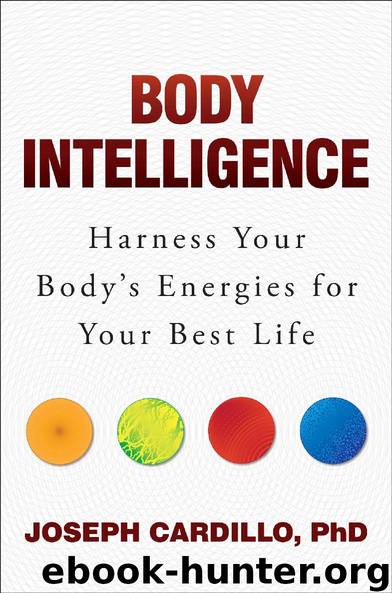Body Intelligence by Joseph Cardillo PhD

Author:Joseph Cardillo, PhD
Language: eng
Format: epub
Publisher: Atria Books
The Informed Power of Emotional Memory
Most people say they can remember emotional events with sharp detail. This is because emotional events have a profound effect on your memory bank. Such memories also have an ongoing effect on the energetic quality and operations of your body, mind, and spirit, just as real-time emotions do.
In his 1951 book, Organization and Pathology of Thought, psychologist David Rapaport relates a compelling experiment originally written about in 1911 by French physician Édouard Claparède in his report titled “Recognition of Me-ness.” 8
As the story goes, Claparède had a patient—a forty-seven-year-old woman—who, similar to the character in the classic movie Memento, had apparently lost her ability to make new memories. One day, before his meeting with his patient, he carried out what he called a “curious experiment” to see if she could remember something that was purely emotional. He put a pin between his fingers and then, when they shook hands, he pushed the pin into her hand. She quickly pulled away, and in a few minutes, forgot that it happened. On the next occasion that he extended his hand for a shake, however, she swiftly withdrew hers and refused.
Claparède had witnessed and then written about two different types of memory: one type that stores events and experiences for conscious recollection at a later time, and another type of memory that can control your behavior without any learning—and without any awareness. Most important, this second memory storage can trigger powerful feelings, thoughts, and actions from under your radar.
The first memory bank is called declarative memory, which requires your conscious, intentional recall. As such, this kind of information involves conscious awareness and learning. If you touch a hot stove, you get burned; you “learn” not to touch it again, and you store that information in your memory to use for later. Declarative memory helps you see objects of your attention in full bloom; you see a wasp (like the one that stung you once before) as a wasp, not as a moth or housefly.
The second type of memory is implicit memory, which is virtually unconscious—you are not intentionally trying to recall the memory—and it is emotionally based, as evidenced when Claparède’s patient refused to take his hand. This is the opposite of declarative memory and is sometimes called procedural (or nondeclarative ) memory. Implicit memories, carrying procedural information and force, kick in automatically, like riding a bike or using a fork. Procedures that carry a great deal of emotional energy (such as giving someone the finger) fire so rapidly that they are completely unconscious, evident only in your actions or your reflections. In such cases, your brain doesn’t just memorize a “task” and launch you into it; it combines with your instinctive fight-or-flight responses and makes a procedural value judgment at lightning speed—and then swiftly executes it, without ever consulting you. This is similar to what occurs with fear-based memory, which, as we discussed earlier, is fuzzy and inaccurate most of the time.
Implicit memory can be dangerous when combined with a negative mood and rapid changes in your blood chemistry.
Download
This site does not store any files on its server. We only index and link to content provided by other sites. Please contact the content providers to delete copyright contents if any and email us, we'll remove relevant links or contents immediately.
Becoming Supernatural by Dr. Joe Dispenza(7106)
Tools of Titans by Timothy Ferriss(6947)
The Witchcraft of Salem Village by Shirley Jackson(6584)
Inner Engineering: A Yogi's Guide to Joy by Sadhguru(5897)
The Four Agreements by Don Miguel Ruiz(5511)
The Power of Now: A Guide to Spiritual Enlightenment by Eckhart Tolle(4755)
The Wisdom of Sundays by Oprah Winfrey(4626)
Room 212 by Kate Stewart(4107)
Fear by Osho(4085)
Pale Blue Dot by Carl Sagan(4001)
The David Icke Guide to the Global Conspiracy (and how to end it) by David Icke(3882)
Rising Strong by Brene Brown(3781)
Animal Frequency by Melissa Alvarez(3755)
How to Change Your Mind by Michael Pollan(3679)
Sigil Witchery by Laura Tempest Zakroff(3652)
Real Magic by Dean Radin PhD(3568)
Secrets of Antigravity Propulsion: Tesla, UFOs, and Classified Aerospace Technology by Ph.D. Paul A. Laviolette(3450)
The Art of Happiness by The Dalai Lama(3384)
Man and His Symbols by Carl Gustav Jung(3315)
